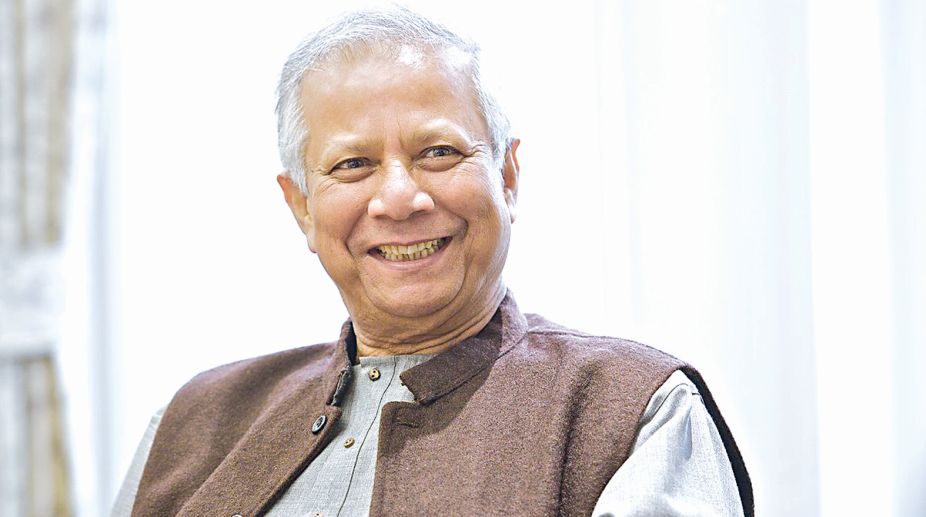Muhammad Yunus, the Bangladeshi economist who pioneered the concepts of microcredit and microfinance, and received the Nobel Peace Prize for founding the Grameen Bank in a bid to alleviate poverty, is one of the most incisive social critics of contemporary times.
In his latest book, ‘’A World of Three Zeros: The New Economics of Zero Poverty, Zero Unemployment and Zero Net Carbon Emissions”, he opines that to save humankind and the planet, we need a new economic system based on a more realistic vision of human nature ~ one that recognises altruism and generosity as driving forces that are just as fundamental and powerful as self-interest.
He was in Jaipur to attend the Jaipur Literature Festival recently. In an interview with NIVEDITA R, he speaks about his work, social entrepreneurship and faults in the current economic system. Excerpts:
Q: Tell us about your current book.
A: My book speaks about the idea of a world of three zeros: such as zero poverty, zero unemployment and zero net carbon emissions. A world where there is no poverty and no unemployment. I believe that we need a new economic system as it is highly flawed in various ways. The poverty is not created by poor people, it is created by the systems that we created.
Q: Why do you think our current economic system is flawed?
A: Look at the way the institutions are built, particularly the financial institutions. They are meant to lend money to people in need but in practice they lend money to the people who are already rich. And they try to explain it by saying that those people aren’t credit-worthy.
Then I raised a question that should the bank ask them whether they are credit worthy or not or should the people tell whether a bank is people-worthy or not. The whole system interprets human minds in a completely narrow way as driven by self-interest only, as if the human being is a machine of selfishness. Human beings are way more than that. We are a combination of selfishness and selflessness but the capitalist theory we practice does not include the selfless part. All the problems around us, including poverty, stem from that theory.
Q: Tell us about your experience of working towards this cause.
A: Luckily I got into this work. We lend money without collateral or any guarantee, and we haven’t had a problem of getting the money back. So I see that entire financial system rejects more than half the population of the entire world, that’s the root cause of poverty. I started businesses to solve problems and not to make money. I was only trying to distance it from charity, as I felt charity is great but one basic problem with charity is that once the problem gets solved, money doesn’t come back.
There’s only one time usage of money. But, in a business, money goes out, does the work and comes back and thus remains in the system. I call it social business, one that I have been doing all my life. It has become a global phenomenon now with young people coming forward and getting involved enthusiastically. Social business is a non-dividend business to solve human problems.
Q: Since you have also mentioned zero unemployment in your book, how do you think that can be achieved?
A: A lot of young people are unemployed in Bangladesh, India and even globally in countries like Spain, and Greece where 40 to 50 per cent of the people are unemployed. I think that the flaw in our economic system is that the only way for human beings to continue with their lives is to find a job, so everybody has to find a job. That is a wrong interpretation. In the history of human beings, there was no such thing. We have always been go-getters.
Human beings are independent and they are born as entrepreneurs, not job-seekers. If we all become entrepreneurs, there is no question of unemployment. Problem of unemployment is created by the concept of employment. That theory has gotten into our minds. You never get a chance to find out who you really are or what your destiny was. The only destiny you have is to work for somebody else. That’s such a compromise!
Q: What would be the one piece of advice that you would like to give to the younger generation?
A: You have to imagine what kind of world you want to live in. You are not just a tenant in the world somebody created. You are a creator and you build your own world. Let your imagination flow as much as you want. The interesting thing is what you imagine will happen. If you don’t imagine, it won’t happen. Imagination is a great power.
Q: What keeps you persistently motivated and inspired?
A: Seeing young people respond so enthusiastically and also get passionately involved, keeps me motivated. A lot of young people get involved and start doing things which were never done before and which completely opens up a new horizon for everyone. That’s exciting and very inspirational. Even my book has examples of people doing different kinds of social businesses and those examples are very inspiring.











